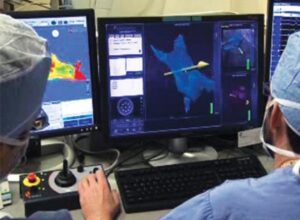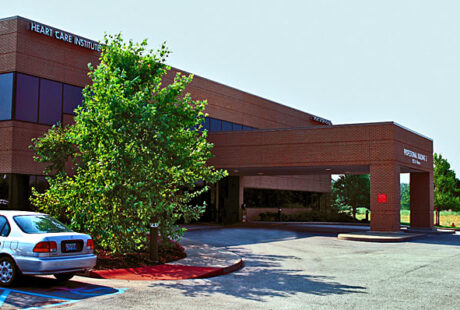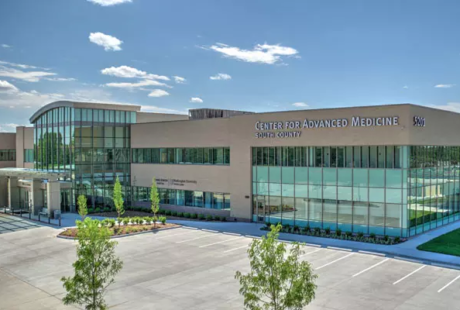
The clinical electrophysiology service is nationally and internationally recognized for its expertise in the evaluation and management of cardiac arrhythmias. The Electrophysiology Section performs more than 1,500 procedures per year for patients with a wide range of rhythm disorders, from the common to the complex. The section is part of the Center for Heart Rhythm Disorders, which is a multidisciplinary Center of Excellence supported by an extensive network of collaborative clinical services.
Many advances in arrhythmia care were developed by physicians at Washington University, including the Cox-Maze procedure, a revolutionary treatment for atrial fibrillation, which formed the basis for the current endovascular approach to treating atrial fibrillation.
The Section of Electrophysiology continues to stand at the forefront of arrhythmia treatment, and have been pioneering the use of the gamma knife using stereotactic cardiac ablation radiotherapy (a.k.a. the Gamma Knife) to treat intractable ventricular arrhythmias that are not amenable to traditional ablative strategies.
In collaboration with the Cardiac Bioelectricity and Arrhythmia Center, the Electrophysiology Section has also pioneered the development of non-invasive imaging approaches using electrographic imaging (ECGI) to diagnose atrial and ventricular arrhythmias. The program also offers a two year ABIM certified training program in electrophysiology.
Director
Clinical expertise
- Ablation procedures including:
- Atrial fibrillation
- Atrial flutter
- Focal atrial tachycardia
- Supraventricular tachycardia (SVT)
- Wolff-Parkinson White (WPW) syndrome
- Ventricular arrhythmias
- Assessment of risk for ventricular arrhythmias
- Cardiac resynchronization therapy
- Cardioversion
- Implantable cardioverter defibrillator (ICD) implants
- Diagnostic electrophysiology studies
- Pacemaker implantations
Physicians from the Center for Heart Rhythm Disorders diagnose and treat a wide range of rhythm disorders, from the most common to the most complex heart rhythm disorders and difficult to treat arrhythmias. The multidisciplinary approach to the diagnosis and treatment of heart rhythm disorders includes:
Testing
The first step is to establish the correct diagnosis, which can be done through different types of cardiac testing, including:
- Ambulatory monitoring
- Cardiac imaging
- Electrocardiogram
- Electrophysiological study
- Genetic testing for inherited channelopathies
- Implantable loop recorder
- Tilt table test
Clinical affiliations
- Cardiac Bioelectricity and Arrhythmia Center
- Mallinckrodt Radiology Institute
- Genomics and Pathology Services
- Atrial Fibrillation Center
- Surgical treatment of atrial fibrillation
Contact information
Referring Physicians: 314-362-1291
Patients: 314-362-1291 or 888-210-8375

Barnes-Jewish West County Hospital
Heart & Vascular Center in West County
- Physical Address: 1020 North Mason Road, Creve Coeur, MO, USA
-
Mailing Address:
1020 N. Mason Road, Suite 200
Creve Coeur, MO 63141 - Phone: 314-362-1291

Center For Advanced Medicine (CAM)
Washington University and Barnes Jewish Heart & Vascular Center
- Physical Address: 4921 Parkview Place, St. Louis, MO, USA
-
Mailing Address:
4921 Parkview Place Suite 8A
St. Louis, MO 63110 - Phone: 314-362-1291
Monday – Friday: 9 am – 4 pm and Saturday: 9 am – 1:30 pm

Center for Advanced Medicine (CAM) South County
Heart & Vascular Center in South County
- Physical Address: 5201 Midamerica Plaza, St. Louis, MO, USA
-
Mailing Address:
5201 Midamerica Plaza, Suite 2300
St. Louis, MO 63129 - Phone: 314-362-1291